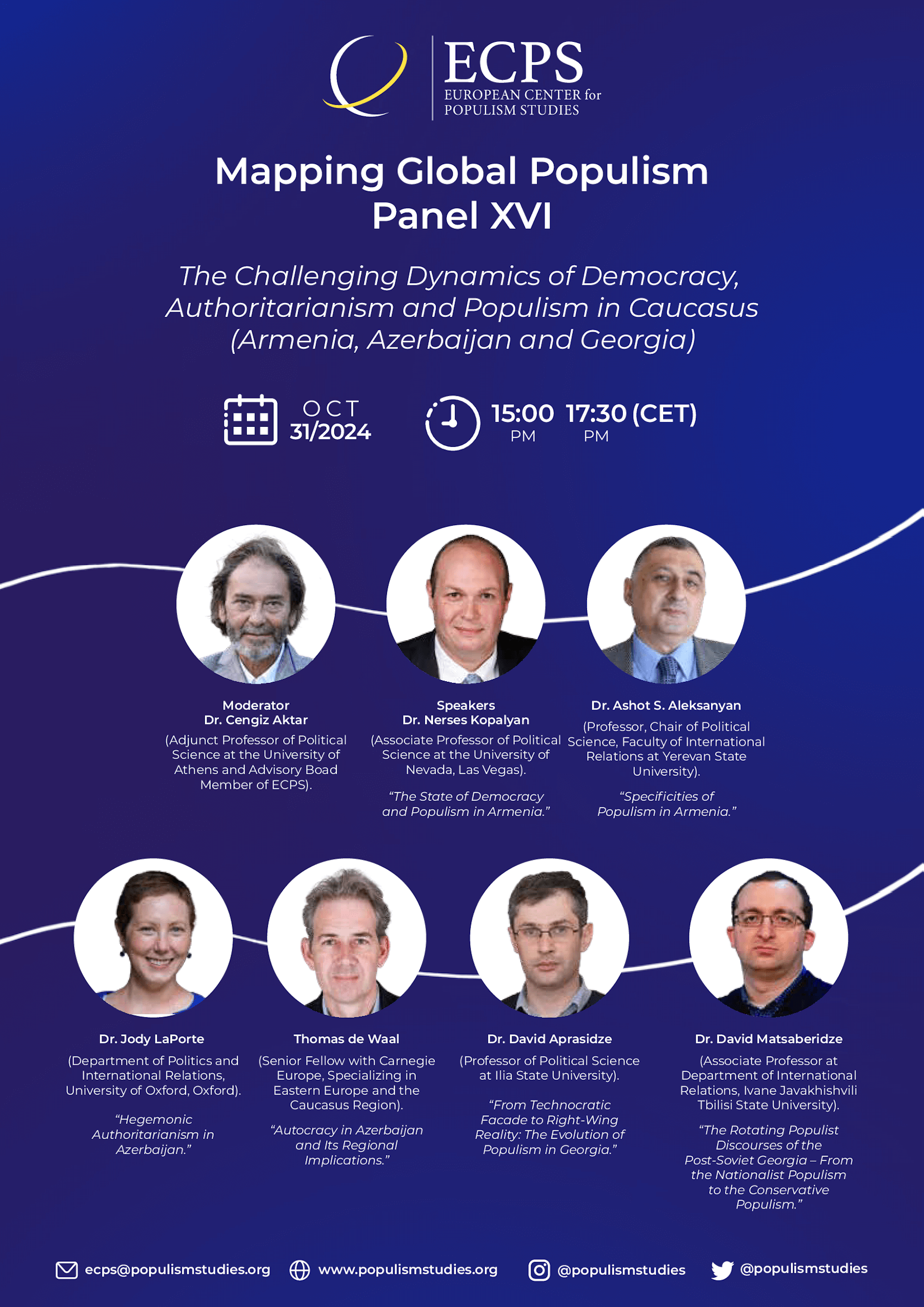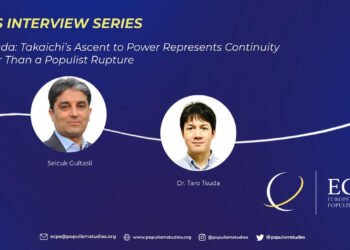Please cite as:
Koskina, Stavroula. (2024). Populism, Democracy, and Authoritarianism in the Southern Caucasus. European Center for Populism Studies (ECPS). November 26, 2024. https://doi.org/10.55271/rp0088
The 16th session of the Mapping Global Populism Panel Series hosted by the European Center for Populism Studies (ECPS) critically examined the interplay of populism, democracy, and authoritarianism in the Southern Caucasus. Featuring insights from six distinguished scholars, the event focused on Armenia, Azerbaijan, and Georgia, offering a detailed analysis of their respective political landscapes. Moderated by Professor Cengiz Aktar, this session underscored the broader implications of populist and authoritarian trends on regional stability and global democracy.
Report by Stavroula Koskina
The 16th session of the European Center for Populism Studies’ (ECPS) “Mapping Global Populism” panel series, aimed at creating a comprehensive understanding of populism worldwide, was held online on October 31, 2024. Titled “The Challenging Dynamics of Democracy, Authoritarianism & Populism in Caucasus (Armenia, Azerbaijan & Georgia),” the session featured insights from distinguished scholars on various manifestations of populism and authoritarianism and the state of democracy in these countries. This report provides an overview of the topics analyzed, with some accounts of each speaker’s contributions.
The panel was moderated by Dr. Cengiz Aktar, Adjunct Professor of Political Science at the University of Athens and Advisory Board Member of ECPS. Thomas de Waal, Senior Fellow at Carnegie Europe specializing in Eastern Europe and the Caucasus, discussed the level of autocracy in Azerbaijan and its regional implications. Dr. David Aprasidze, Professor of Political Science at Ilia State University, Georgia, explored the evolution of populism in Georgia, while Dr. David Matsaberidze, Associate Professor in the Department of International Relations at Ivane Javakhishvili Tbilisi State University, presented on “The Rotating Populist Discourses of Post-Soviet Georgia – From Nationalist Populism to Conservative Populism.”
Dr. Jody LaPorte, from the Department of Politics and International Relations at the University of Oxford, analyzed hegemonic authoritarianism in Azerbaijan. Dr. Ashot S. Aleksanyan, Professor and Chair of Political Science at the Faculty of International Relations, Yerevan State University, focused on post-war Armenia’s democratization and European integration under the shadow of populism. Dr. Nerses Kopalyan, Associate Professor of Political Science at the University of Nevada, Las Vegas, provided an overview of the state of democracy and populism in Armenia during the session.
The panelists emphasized how populism contributes to democratic backsliding and institutional fragility in hybrid regimes. While each country reflects unique manifestations of populism, shared patterns include the erosion of liberal democratic norms and the increasing fusion of political and economic power within ruling elites.
The discussions highlighted how regional actors navigate shifting global power structures, particularly under the shadow of Russia’s invasion of Ukraine. These external pressures exacerbate domestic challenges, influencing political strategies and policy orientations across the region.
Country-Specific Analyses
Tom de Waal’s presentation provided a comprehensive analysis of Azerbaijan’s political trajectory and its broader implications for the South Caucasus. He highlighted Azerbaijan as a model of hegemonic authoritarianism, emphasizing its consolidation of power through a fusion of political and economic interests within the ruling elite. He noted Azerbaijan’s skepticism toward multilateral institutions and its alignment with illiberal regional actors like Russia and Turkey. De Waal underscored the Azerbaijani regime’s strategic use of sovereignty discourse to legitimize its dominance while curtailing civil liberties, media freedom, and opposition activity. He also addressed the geopolitical influence of the Ukraine war on the region, arguing that Azerbaijan’s approach reflects a broader trend of illiberalism gaining ground globally. Finally, he pointed to Azerbaijan’s vulnerabilities, including its reliance on declining oil revenues and the absence of mechanisms for political feedback, which pose challenges to the sustainability of its centralized authoritarian model.
Dr. David Aprasidze’s presentation critically assessed the damaging impact of populism on democracy in Georgia, particularly under the Georgian Dream Party. He argued that populism undermines democratization in hybrid regimes by eroding weak institutions, corrupting political actors, and suppressing opposition forces. Tracing the Georgian Dream’s transformation from a progressive, left-leaning populist movement into a conservative, nationalist entity, he highlighted its increasing alignment with illiberal models, such as that of Viktor Orbán’s Hungary. This shift has been accompanied by attacks on the European Union, restrictions on civil society and media, and the systemic manipulation of institutions to consolidate power. Dr. Aprasidze underscored that populism in hybrid regimes exacerbates public demoralization, weakens democratic resilience, and facilitates authoritarian consolidation. He concluded that the Georgian Dream’s trajectory exemplifies the broader risks of populism in hybrid regimes, portraying Georgia’s democratization as increasingly fragile and imperiled.
Dr. David Matsaberidze’s analysis explored the evolution of populism in Georgia through the concept of the "empty signifier," tracing its progression from nationalist mobilization during the dissolution of the Soviet Union to the current rule of the Georgian Dream Party. He identified a pattern in Georgian politics of leaders utilizing populist narratives to consolidate power, emphasizing shifts from Zviad Gamsakhurdia’s nationalist independence rhetoric to Eduard Shevardnadze’s focus on order and stability, and later Mikheil Saakashvili’s anti-corruption crusade. Dr. Matsaberidze highlighted the Georgian Dream’s strategic pivot from left-leaning populism to conservative nationalism, blending Orthodox Christian values with populist sovereignty discourse to challenge the European Union’s liberal framework. He also criticized the party’s institutional manipulation, drawing parallels with Viktor Orbán’s Hungary and Vladimir Putin’s Russia, noting the use of restrictive legislation, anti-LGBTQ+ policies, and attacks on NGOs and academia to erode democratic spaces. The party’s success, he argued, lies in its ability to exploit public concerns while fostering ambiguity between aligning with Brussels or Budapest, thereby undermining Georgia’s pro-Western orientation. Concluding with a pessimistic outlook, Dr. Matsaberidze warned that the Georgian Dream’s populist tactics and institutional control present significant obstacles to democratization and resistance by the opposition.
Dr. Jody LaPorte’s presentation examined Azerbaijan’s political regime, categorizing it as a hegemonic authoritarian model distinct from competitive authoritarianism due to the absence of meaningful opposition or electoral competition. She highlighted how Azerbaijan’s leaders, particularly President Ilham Aliyev, consolidated this regime through the marginalization of inherited opposition parties, extensive use of formal and informal mechanisms to suppress political activities, and active repression of emerging opposition groups. The regime’s centralized political economy, heavily reliant on oil revenues and controlled by the ruling elite, has further entrenched its authority by linking economic opportunities and upward mobility to political loyalty. Dr. LaPorte also noted the regime’s proactive measures to adapt to changing circumstances, including investments in green energy and economic diversification, which aim to sustain its authoritarian model amid declining oil revenues. While discussing potential vulnerabilities such as socioeconomic inequalities and the finite nature of hydrocarbon resources, Dr. LaPorte emphasized the regime’s strategic efforts to reinforce its stability. Reflecting on the populism theme, she argued that Azerbaijan’s case is characterized more by a disconnect between politics and the populace than by populist appeals, with citizens largely feeling unrepresented by any political party.
Dr. Ashot Aleksanyan’s presentation analyzed the impact of hybrid populism on postwar Armenia, its democratization efforts, and European integration. He employed a theoretical framework rooted in post-Soviet populist studies, drawing from definitions by scholars like Cas Mudde and Ernesto Laclau to highlight populism’s ideological and moral dimensions. Dr. Aleksanyan emphasized the unique challenges faced by Armenia, including the lack of robust political party infrastructure, weak ideological foundations, and an underdeveloped civil society, all exacerbated by the fallout from the 2020 Nagorno-Karabakh war. He identified hybrid populism as a critical factor in Armenian politics, characterized by divisive rhetoric framing issues through binary oppositions such as war versus peace, pro-Western versus pro-Russian, and democracy versus authoritarianism. He also explored the influence of external factors like the COVID-19 pandemic, the Russia-Ukraine war, and regional pressures from Russia, Turkey, and Azerbaijan, which have collectively hindered Armenia’s European integration and democratization. Using a textual analysis of political speeches and party rhetoric, Dr. Aleksanyan demonstrated how populist discourse destabilizes democratic institutions, undermines reform efforts, and fuels societal polarization. He concluded by stressing the importance of addressing Armenia’s geopolitical vulnerabilities and strengthening its political and societal structures to advance its European integration and democratic aspirations.
Dr. Nerses Kopalyan‘s presentation analyzed the limited influence of populism in post-Velvet Revolution Armenia, emphasizing the country’s democratic resilience despite its challenging geopolitical environment. He highlighted three primary factors that have curtailed populism: a robust civil society acting as a safeguard, the development of a democratic political culture, and the transitional government’s deliberate avoidance of populist rhetoric and practices. Unlike other contexts where populism thrives on anti-establishment and nationalist narratives, Armenian leaders have refrained from scapegoating elites, ethnicizing conflicts, or exploiting societal cleavages for political gain. Instead, the government has pursued pragmatic, often unpopular decisions, such as emphasizing peace and concessions, which reinforce democratic consolidation. Dr. Kopalyan contrasted Armenia’s approach with illiberal populist leaders elsewhere, noting the absence of tactics like undermining institutions, exploiting nationalism, or promoting cultural wars. He concluded that Armenia’s unique governance model, anchored in civil society, democratic norms, and a refusal to weaponize populism, has strengthened its democratization process and served as a critical component of its security architecture amid external pressures from Azerbaijan and Russia.
The panel provided critical insights into the destabilizing effects of populism and authoritarianism in the Southern Caucasus. Across the region, the confluence of weak institutions, contested sovereignty, and geopolitical pressures fosters environments where populism thrives, further undermining democratic governance and societal resilience.
The event underscored the need for targeted international engagement to bolster democratic institutions, support civil society, and promote regional cooperation. Recognizing the distinct challenges faced by each country, panelists stressed the importance of tailored strategies that address both domestic vulnerabilities and external influences.


